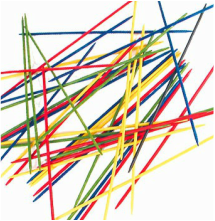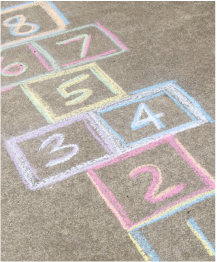
Games, activities and leisure time have changed dramatically and not in a healthy way. You know what I mean. Kids aren't outside. They're not moving around. And, when they're inside, their leisure activities include "screens" and the digital world.
The play of girls centers around language skills, rules and fantasy themes. For boys, it's more about motor control, speed, ball handling skills and competition. Uh oh.
When kids lack these skills in elementary school, other kids include or exclude them based on their abilities. "I don't want you on my team, you can't kick the ball". It doesn't take long for these same kids to be excluded in other situations. Developing social alliances early in elementary school creates a positive reputation and makes a child more attractive as a "friendship candidate" which enhances their sense of competence and self-worth and gives them opportunities to practice critical social skills.
Kids are not developing competencies and the "downstream" impact on their cognitive abilities is evident. When kids engage in the "natural world", they observe and analyze "what" is going on. When a toddler stacks blocks and they fall down, he observes cause and effect. When a child pushes the truck across the carpet and then the floor, she observes that conditions in the environment have an impact.
Opportunities to explore and engage with the natural world encourages not only physical and intellectual growth, but social and personal development. Children learn to tolerate frustration, to persist with a task or seek help. Play is the work of children.
If kids are playing with you or each other, they learn turn-taking and good sportsmanship. Of course, they can practice independently which is a nice variation.
So, how do we make these "basic competencies" training fun without feeling "therapeutic"? That's easy! Let's play!
Let's talk about Hop Scotch. It's cheap. There isn't a lot of "stuff" you have to buy need and it's fun. Hop scotch is chock full of chances to enhance those competencies..
Kids get to draw the pattern on the sidewalk which is fun and enhances their fine motor skills. Then, they practice balance and motor planning skills. Their legs and core are strengthened as they hop on one foot or two! They learn to balance themselves using their arms as counterweights. They have to remember the rules. If you use a rock to place on a number signaling that you must skip over it, additional hand-eye and trajectory skills are used. You can forgo using the rock and you can modify the pattern to accommodate younger kids or those with weaknesses/disabilities. The goal is to set them up for success and make the event fun. You can trade the numbers for letters or symbols and shapes to vary it and make it more entertaining. Create your own symbols and get goofy!
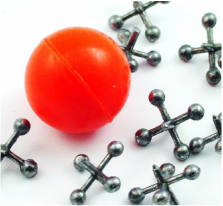
The skills necessary include being able to bounce a ball at a low height and catch it in the same hand and, in the middle of that process, pick up a jack with the same hand. Wow! Look at all that fine motor control, timing, hand-eye coordination and planning. Sequencing, concentration and remembering how many jacks to pick up are also required.
This is one of those games that can cause your child to melt into tears, so modify it until they develop some of the skills. Have them bounce and catch the ball and you put the jack in one of their hands while they are waiting for the ball to come down to catch it. Focus on the "catching the ball" part first and introduce one jack at a time.
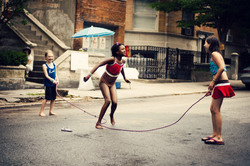
Begin with just slowly moving the rope back and forth (one end anchored to a tree or pole) and encourage your child to jump it. They can use one foot or both feet; it's the timing element you're striving for! Then, progress to "over the head" and finally, your child holds the rope and goes over their head in a full circle and competently clears the rope and stays on their feet.
In order to succeed, they are required to focus on the moving target, time their jump and the altitude of their jump, and prepare for the next jump. Visual and motor planning skills are critical as well as balance using arms and core strength to "land" solidly. One-footed, two-footed, two feet together with confident form should be the sequence for complete mastery.
Adding rhymes to jumping rope is a cultural tradition. They add a fun element to the physical activity. Jump rope rhymes can be found on the internet. Some are found here.
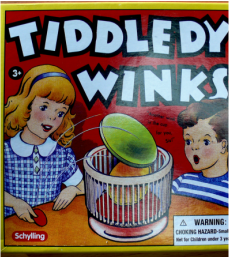
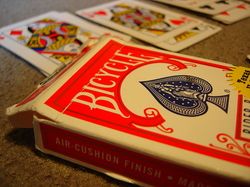
Go Fish is a childhood favorite. Crazy 8 and War are entertaining. War is fast-paced and simply requires each player to "slam" down a card and whomever has the highest value card "takes all". Other games can be found on a website that has complete rules. Teaching games that can be played independently, such as Solitaire, help children learn how to entertain themselves. There's no strategy. It's just luck!
Cards are great chances to practice memory. Start out with 4 or 6 cards that make up two or three sets of 2 cards each. Scatter them on the table or floor or bed with their "faces" turned down. Pick up a card. Pick up another card and see if it's a match. If it is, you keep them both. If there's no match, the cards are placed back in their original spot. As your child's skills improve, add more sets, being careful not to create frustration and stress. This is a game that can be played independently. It teaches visual memory and method of loci skills. This means that using the location of information helps you to recall it.
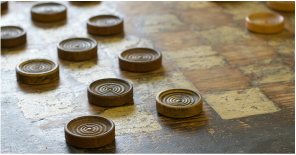
Finally, Simon Says. It's a great game where kids have to pay attention and LISTEN! But this time, listening is fun. You know how to play this. No materials are required. A direction is called out such as "Put your hands on your hips" and if you do, you're out. The "command" needs to be preceded by "Simon Says put your hands on your hips". to make it a legitimate command that must be followed. If there is so much as a flinch without the "Simon Says" part, you're out.
Tic-Tac-Toe and Hangman are fun and easy games. Hangman can be modified down to C-V-C words...Consonant-vowel-consonant in order to be at a level of success for your child.
Keep your "playtime" brief and play frequently. Changing activities stimulates the brain and causes dopamine to dump which is the "reward juice" of the brain. If you keep your agreements to play for short period of times and change the games frequently, your kids will be more willing to play.
Don't forget puzzles! They can be kept on a table and worked on as people pass by! Each family member is responsible for placing a minimal number of pieces daily. It's a team sport!
TTFN, Claudia

